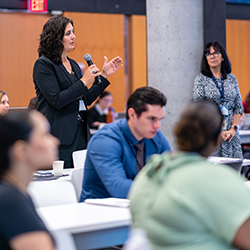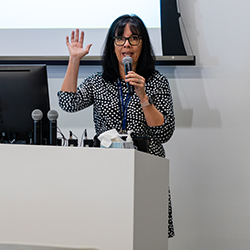Complexities of Maternal Care Highlighted at the Arizona Perinatal Improvement Summit
Recent research published in The Lancet Global Health showed that every year, at least 40 million women are likely to experience a long-term health problem caused by childbirth. These can persist for months or even years post-delivery. These issues can vary, and some can begin far before the baby is born; or they can relate to factors generally unaccounted for in maternal health care.

To help combat these issues, as well as raise greater awareness about them, the University of Arizona College of Medicine – Phoenix welcomed experts from across the U of A Health Sciences and the country to present at the Arizona Perinatal Improvement Summit April 19.
Maria Manriquez, MD, FACOG, FASAM, PMH-C — director of the Undergraduate Medical Education Pain and Addiction Curriculum and the medical director for Addiction Medicine at Banner – University Medical Center Phoenix — organized the summit and presented. She was excited for the college to host conversations on these important topics.
“In an attempt to support providers in battling perinatal morbidity and mortality, we are thrilled that Arizona Biomedical Research Centre (ABRC) was able to fund this event. We are excited to facilitate sessions that will address various issues related to perinatal complications and maternal deaths,” she said.
Dr. Manriquez’s talk, “Perinatal Substance Use Disorder Program: Comprehensive Care,” focused on how providers can better care for pregnant patients suffering from substance use disorder (SUD).
Currently, around 21.6% of pregnant women enrolled in Medicaid will receive a prescription for opioids, and antepartum opioid use has increased dramatically since the start of the 2000s. One in 300 women who undergo cesarean section during birth will become dependent on opioids because of the procedure. For mothers with SUD prior to birth, Neonatal Withdrawal Syndrome is both costly and dangerous. In 2015 alone, it accounted for $1.5 billion for the health care industry.
These statistics are staggering, and they are closely linked with patients who have mental health issues, as well. So, despite opioid prescriptions going down, the rise of synthetic opioids (like fentanyl) have exacerbated issues such as postpartum overdose deaths. Dr. Manriquez discussed the risks associated with SUD for pregnant and parenting women, and outlined key steps she has taken to help turn the tide.
“The majority of the risk is withdrawal. And I can tell you from sitting with many of my patients — up nights, talking with them — the anxiety of just trying to get the treatment is overwhelming and really, really, really hard,” Dr. Manriquez explained. And that “Acute opioid withdrawal carries the risk of increased miscarriage, placental abruption, preterm birth and stillbirth,” she added.
The solution: bridge the gap in the care for women dealing with SUD and other mental health issues. It is traditional versus comprehensive care. A typical woman visiting her obstetrician will have their blood pressure checked, their weight assessed, and will have a plan for labor and delivery developed. That general care plan overlooks so much of what a patient may be dealing with outside of just the pending birth.

Whereas “Comprehensive care provides all the other elements that are so important to help patients be stable and healthy,” Dr. Manriquez said. Those elements include providing advanced prenatal services (MFM), addiction medicine and behavioral health treatment to better prepare birthing families for success. “The benefits address the root causes of substance use disorder and help long term recovery; create a supportive environment that reduces stigma and encourages engagement; and improve health outcomes for the mothers, babies and families.”
Dr. Manriquez stressed that the breadth of comprehensive care can ensure decreased hospitalizations for mothers and newborns; lessen the odds of relapse for those with SUD; and decrease maternal, fetal and newborn morbidity.
The conference also featured a talk by Dean Coonrod, MD, MPH, FACOG, a professor of Obstetrics and Gynecology (OB/GYN) at the College of Medicine – Phoenix and the chair of the Department of OB/GYN at District Medical Group. Dr. Coonrod, a mentor of Dr. Manriquez, discussed how critical it is for a physician to stay involved with a mother’s care well after they have given birth.
The Fourth Trimester concept, the 12 weeks following the birth of the baby, refers to the immense emotional and physical change women experience during and after childbirth. As Dr. Coonrod detailed, that timeframe is a critical window for physicians to monitor their patients’ health and wellbeing; and it is linked to the rise in postpartum maternal mortality. Those rates can be attributed either directly to the birth itself — like postpartum hemorrhage — or indirectly — a preexisting condition made worse by pregnancy, like cardiac disease, mental health and SUD.
The central focus, though, was on those preexisting health conditions and how they may be affected by the pregnancy. Since they are not explicitly monitored during and immediately following the delivery, it is essential patients understand that these risks can carry on for weeks after delivery. “Risk does not go away at discharge. We can educate our patients better, we can do a better job with our postpartum nurses and with warning signs,” Dr. Coonrod said.
This includes educating colleagues in the emergency department who may be seeing women experiencing issues post-pregnancy, as well as creating better standards for OB/GYN practitioners. “We can see patients sooner than that six-weeks concept that’s out there. Those with high blood pressure can have sooner blood pressure checks because that's when the strokes happen with hypertensive disorders — not when they're in the hospital, but soon after they go home — and we can take advantage of telemedicine to improve those processes,” he said.

Up to 42 days post-delivery, Dr. Coonrod advised it is best to refer a patient to their obstetrician should any issues arise. He then detailed how the American College of Obstetricians and Gynecologists has structured what optimal postpartum care should look like.
That includes having the primary maternal care provider assuming responsibility for the woman’s care through the comprehensive postpartum visit; contact with the patient within the first three weeks, including a blood pressure check in the first three to 10 days and a follow up one to three weeks after for high risk patients; ensuring opportunity for ongoing visits as needed over the next three to 12 weeks; and then, from four to 12 weeks, conducting the comprehensive postpartum visit and transitioning to well-woman care.
“The bottom line is this is more of a continuum and a process. We have expanded the care team through this method, and it includes more than just the physical health. This whole concept of expanding postpartum care and including that period after 42 days is especially important for our patients,” he said.
In addition, the summit featured presentations from other leading experts in the fields of obstetrics and gynecology, including Pamela Garcia-Filion, PhD, MPH, an associate research professor in the Department of Biomedical Informatics; Sarah Kellerhals, MD, an alumna from the college’s Class of 2017 and current fellow in the college’s Maternal Fetal Medicine Fellowship; Torre Halscott, MD, MS, an assistant professor of Obstetric Critical Care, Maternal-Fetal Medicine and Critical Care Medicine at the Johns Hopkins University School of Medicine; and Elice Erickson, PhD, CNM, FACNM, an assistant professor at the BIO5 Institute and the U of A College of Nursing, and Erin McMahon, EdD, CNM, FACNM, an assistant clinical professor at the U of A College of Nursing, as well as director of their Nurse Midwife program.
They covered the current state of affairs in perinatal mortality and morbidity; the association between maternal mortality and adverse childhood experiences/community environments; critical care management for severe perinatal morbidity; and how to best develop a layered approach to maternal mental health respectively.
About the College
Founded in 2007, the University of Arizona College of Medicine – Phoenix inspires and trains exemplary physicians, scientists and leaders to advance its core missions in education, research, clinical care and service to communities across Arizona. The college’s strength lies in our collaborations and partnerships with clinical affiliates, community organizations and industry sponsors. With our primary affiliate, Banner Health, we are recognized as the premier academic medical center in Phoenix. As an anchor institution of the Phoenix Bioscience Core, the college is home to signature research programs in neurosciences, cardiopulmonary diseases, immunology, informatics and metabolism. These focus areas uniquely position us to drive biomedical research and bolster economic development in the region.
As an urban institution with strong roots in rural and tribal health, the college has graduated more than 1,000 physicians and matriculates 130 students each year. Greater than 60% of matriculating students are from Arizona and many continue training at our GME sponsored residency programs, ultimately pursuing local academic and community-based opportunities. While our traditional four-year program continues to thrive, we will launch our recently approved accelerated three-year medical student curriculum with exclusive focus on primary care. This program is designed to further enhance workforce retention needs across Arizona.
The college has embarked on our strategic plan for 2025 to 2030. Learn more.